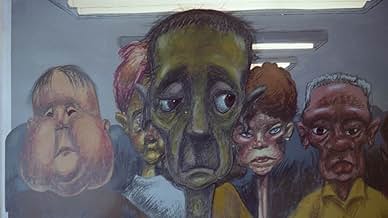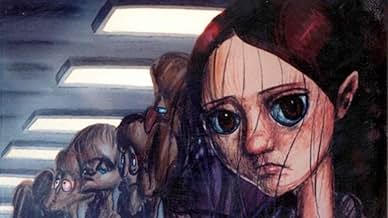In a subway station, a man watch a girl acting strange. He realizes that she may be attempting to commit suicide and tries to stop her, but the girl accuses him of being a molester.In a subway station, a man watch a girl acting strange. He realizes that she may be attempting to commit suicide and tries to stop her, but the girl accuses him of being a molester.In a subway station, a man watch a girl acting strange. He realizes that she may be attempting to commit suicide and tries to stop her, but the girl accuses him of being a molester.
- Director
- Writer
- Awards
- 5 wins total
Storyline
Did you know
- ConnectionsReferenced in Sarcophagus: An Essay on Life as a Teenage Zombie (2004)
Featured review
During the first half of the decade of the 90s, Mexican cinema experienced a resurgence that seemed to point to a new "Golden Age". The critical and commercial success of movies like "Sólo con Tu Pareja", increased the optimism about the future of Mexican cinema, but sadly, the severe financial problems that the country suffered in 1994 made the survival of the "New Mexican Cinema" far more difficult than expected. Among the filmmakers of the "New Mexican Cinema" generation who managed to keep working through the 90s was Carlos Carrera, a prolific director of short films whose 1991 feature length debut was the remarkable "La Mujer De Benjamín". After the mediocre results his second movie, "La Vida Conyugal", Carrera returned to short films and produced "El Héroe", the animated short film that would give him worldwide praise.
Through its 5 minutes of duration, "El Héroe" (literally "The Hero") tells the story of a common everyman who lives in Mexico City and has to constantly face the different problems of the asphalt jungle. In a typical subway station, he witnesses the daily human drama of the urban citizens, often hidden inside the anonymity of the masses. Corruption and indifference seems to be overtly present, with pickpockets happening in front police officers without any problem. While waiting for the next train, our hero sees a lonely teenage girl with a sad look in her face standing too close to the edge, waiting eagerly for the next train. Realizing that the girl is going to jump, our hero decides to stop her and begins to walk towards her. Walking through the human wall with enormous difficulty, he manages to stop the girl from jumping, but there is a surprise for our hero in the end.
Written by director Carlos Carrera himself, "El Héroe" is a bleak and depressing story that obviously has social indifference as its main subject, however, it also touches several other themes, such as urban decay and its corruptive effects on society, specially the dehumanization and ultimate loss of identity of people living in the big cities. Of course, Carrera takes a very extreme approach in his representation of the urban nightmare, however, while his take on the subject is certainly exaggerated, his portrait of the city as a corrupting environment has a considerable dose of realism as it is a powerful reflection of what was the reality of Mexico during the 90s. While there is only one word in the whole movie, Carrera develops his characters with considerable skill, product of his extensive experience in making short animated movies.
Before making his first feature length film, Carrera made himself a name as director of high quality short films, and "El Héroe" was one of Carrera's personal projects that he had been preparing since his days as a student in the 80s. Since budgetary reasons disabled him from making it with actors on real locations, Carrera decided to return to his roots as an animator and made it an animated movie. While this would seem to make the film less realistic, it's actually the opposite, as by exaggerating the darkness of the urban landscape, Carrera actually makes it feel closer to home. His visual design is simply wonderful, as he makes the haunting and grotesque images look beautiful; and thanks to his excellent use of color, he manages to capture perfectly the atmosphere of decadence and nostalgia that fills every minute of his story.
While many people do not consider short films as "proper movies", they are actually an art form as valid as feature length films, and Carrera's "El Héroe" can be considered a masterpiece of that specific medium. Not only it shows that a lot can be said in a few minutes, the fact that there has never existed an animation industry in Mexico makes Carrera's work even more impressive. It took Carrera many years to create this project, but in the end, the movie was worth the effort, as "El Héroe" would win the Golden Palm for short films at Cannes that year. Thanks to the attention he won with this success, Carrera had the chance to keep showing his talent as a filmmaker and his career survived the difficulties that Mexican cinema faced in the 90s. Despite its short runtime, "El Héroe" ranks easily among the best movies that the "New Mexican Cinema" gave in the 90s. 9/10
Through its 5 minutes of duration, "El Héroe" (literally "The Hero") tells the story of a common everyman who lives in Mexico City and has to constantly face the different problems of the asphalt jungle. In a typical subway station, he witnesses the daily human drama of the urban citizens, often hidden inside the anonymity of the masses. Corruption and indifference seems to be overtly present, with pickpockets happening in front police officers without any problem. While waiting for the next train, our hero sees a lonely teenage girl with a sad look in her face standing too close to the edge, waiting eagerly for the next train. Realizing that the girl is going to jump, our hero decides to stop her and begins to walk towards her. Walking through the human wall with enormous difficulty, he manages to stop the girl from jumping, but there is a surprise for our hero in the end.
Written by director Carlos Carrera himself, "El Héroe" is a bleak and depressing story that obviously has social indifference as its main subject, however, it also touches several other themes, such as urban decay and its corruptive effects on society, specially the dehumanization and ultimate loss of identity of people living in the big cities. Of course, Carrera takes a very extreme approach in his representation of the urban nightmare, however, while his take on the subject is certainly exaggerated, his portrait of the city as a corrupting environment has a considerable dose of realism as it is a powerful reflection of what was the reality of Mexico during the 90s. While there is only one word in the whole movie, Carrera develops his characters with considerable skill, product of his extensive experience in making short animated movies.
Before making his first feature length film, Carrera made himself a name as director of high quality short films, and "El Héroe" was one of Carrera's personal projects that he had been preparing since his days as a student in the 80s. Since budgetary reasons disabled him from making it with actors on real locations, Carrera decided to return to his roots as an animator and made it an animated movie. While this would seem to make the film less realistic, it's actually the opposite, as by exaggerating the darkness of the urban landscape, Carrera actually makes it feel closer to home. His visual design is simply wonderful, as he makes the haunting and grotesque images look beautiful; and thanks to his excellent use of color, he manages to capture perfectly the atmosphere of decadence and nostalgia that fills every minute of his story.
While many people do not consider short films as "proper movies", they are actually an art form as valid as feature length films, and Carrera's "El Héroe" can be considered a masterpiece of that specific medium. Not only it shows that a lot can be said in a few minutes, the fact that there has never existed an animation industry in Mexico makes Carrera's work even more impressive. It took Carrera many years to create this project, but in the end, the movie was worth the effort, as "El Héroe" would win the Golden Palm for short films at Cannes that year. Thanks to the attention he won with this success, Carrera had the chance to keep showing his talent as a filmmaker and his career survived the difficulties that Mexican cinema faced in the 90s. Despite its short runtime, "El Héroe" ranks easily among the best movies that the "New Mexican Cinema" gave in the 90s. 9/10
Details
Contribute to this page
Suggest an edit or add missing content

















